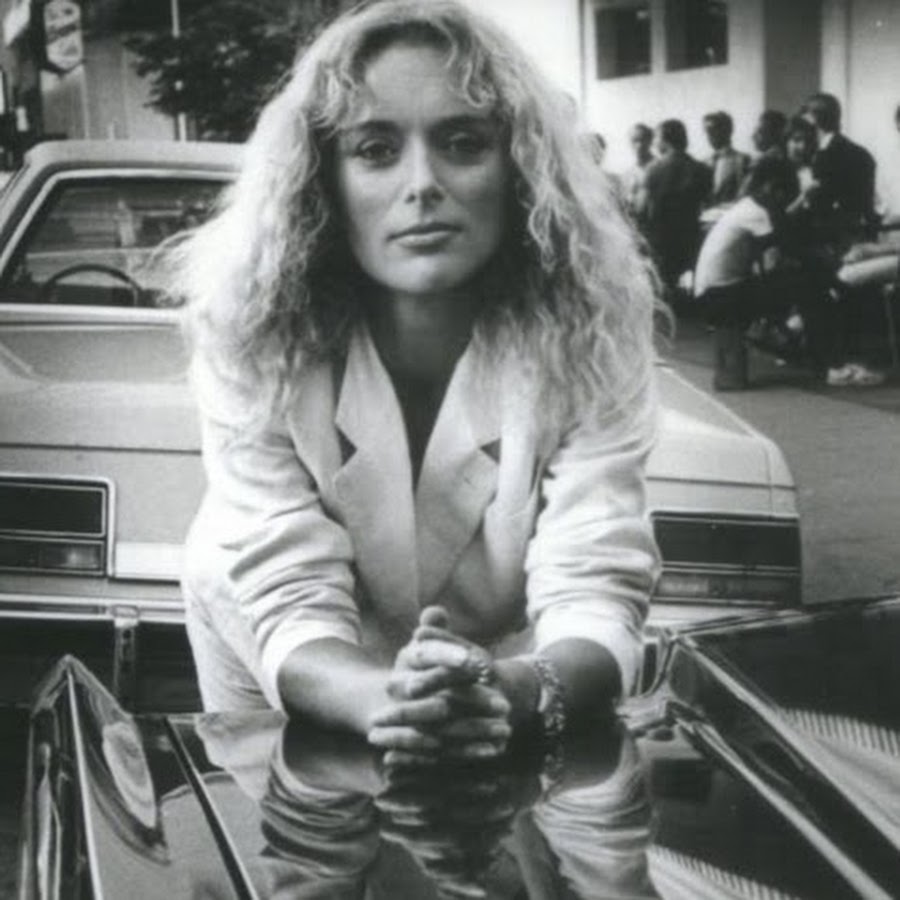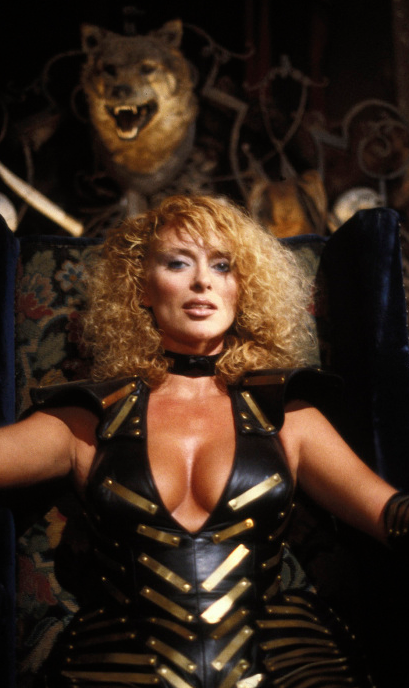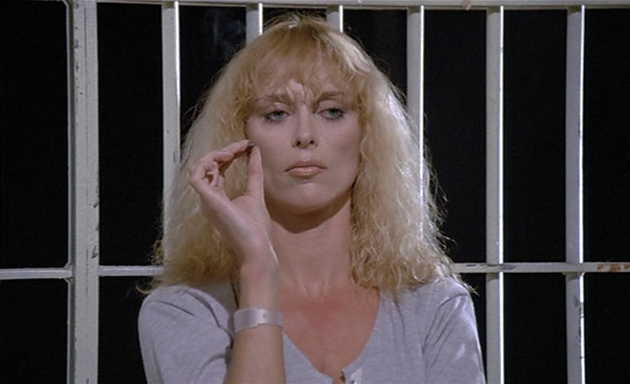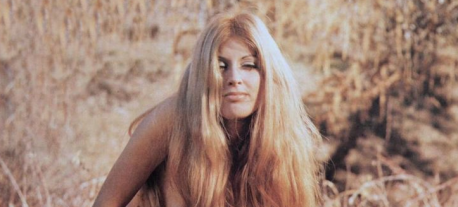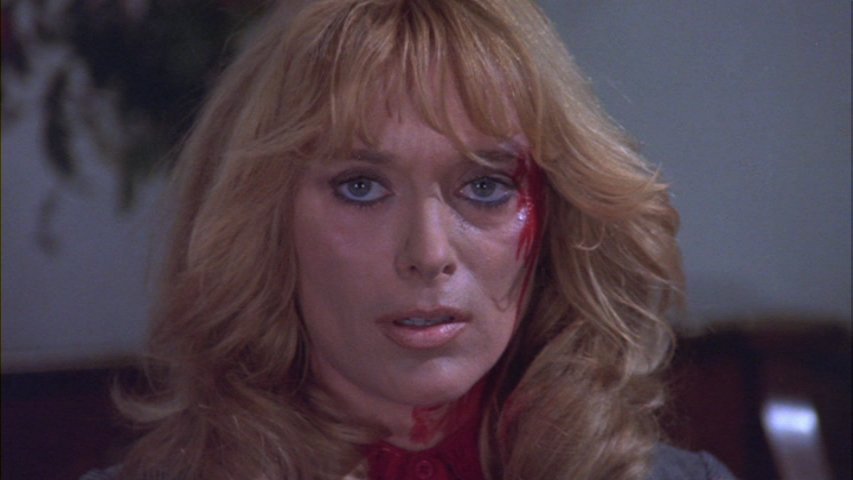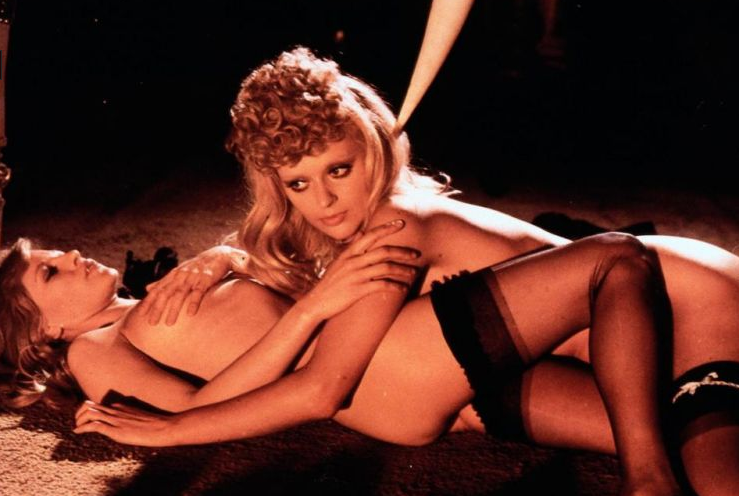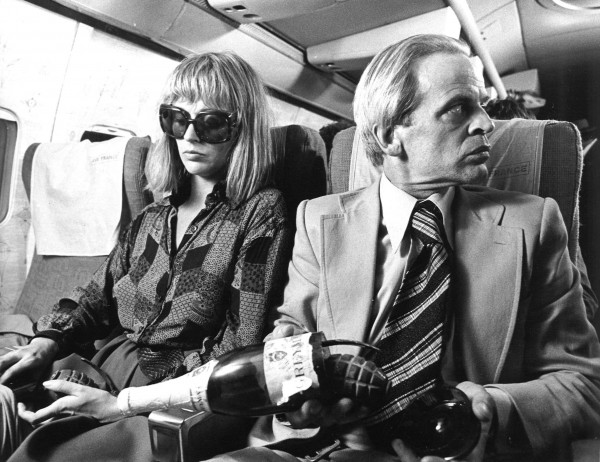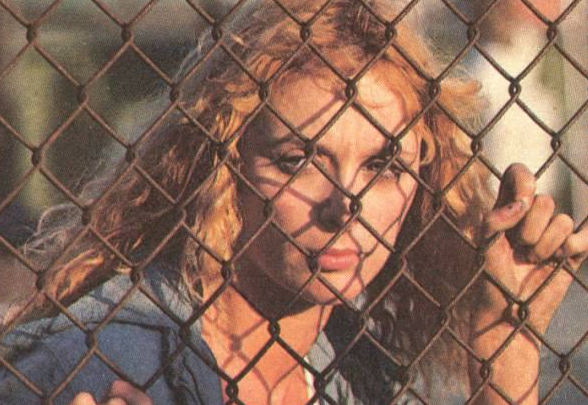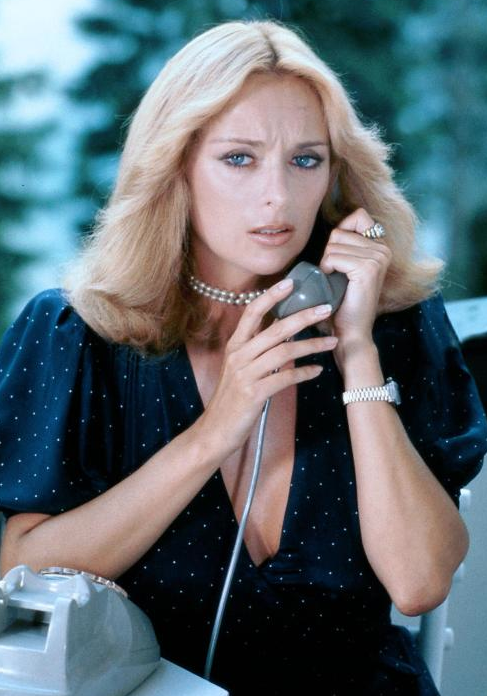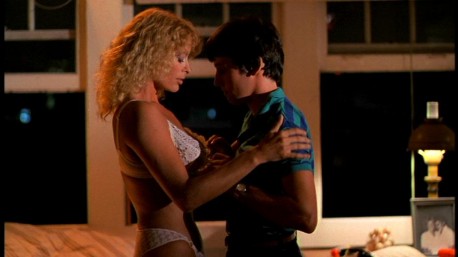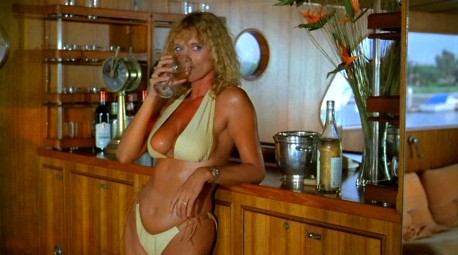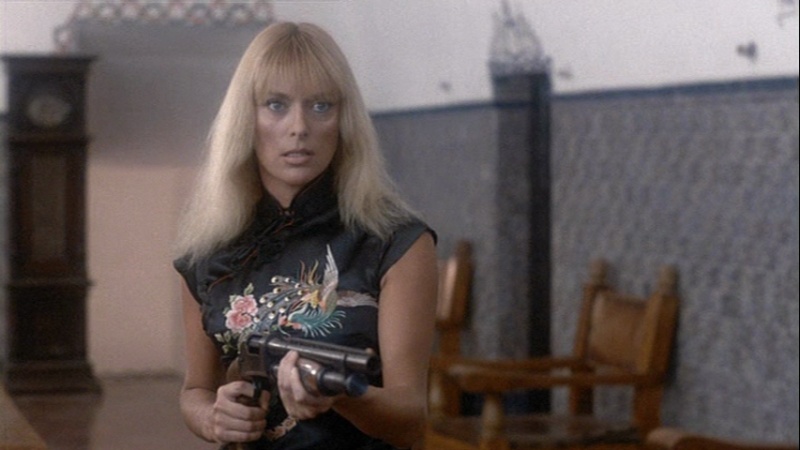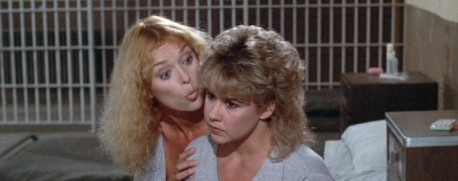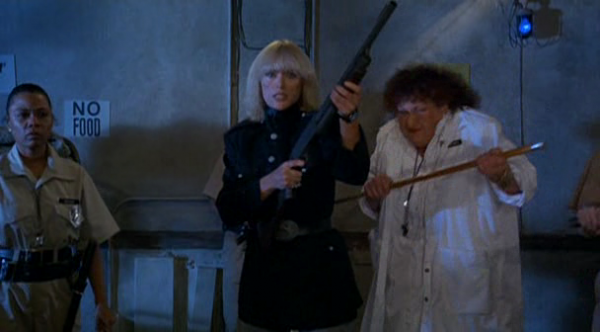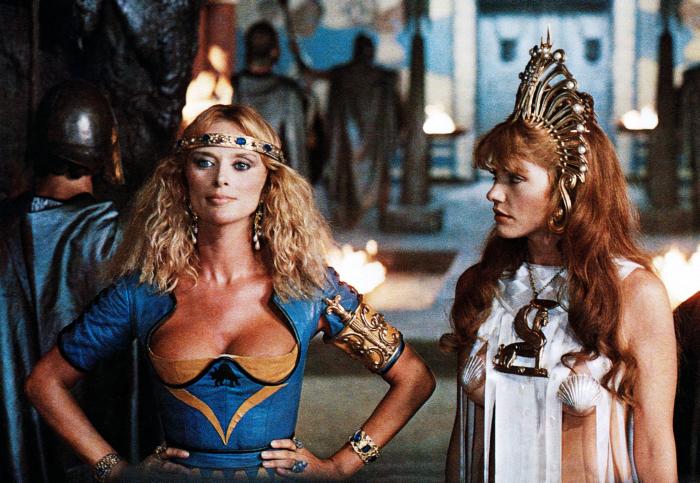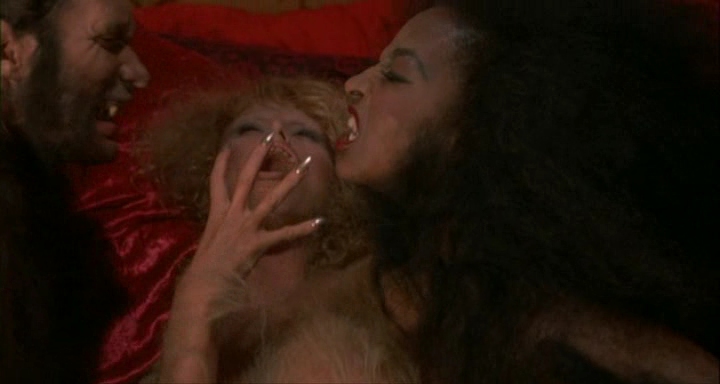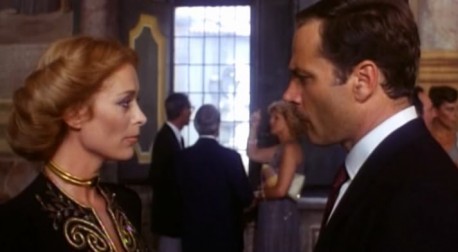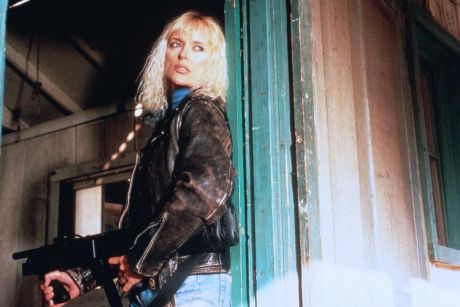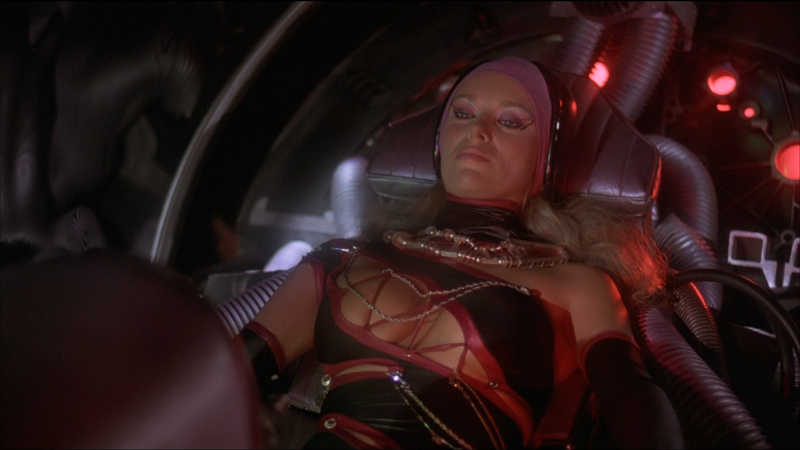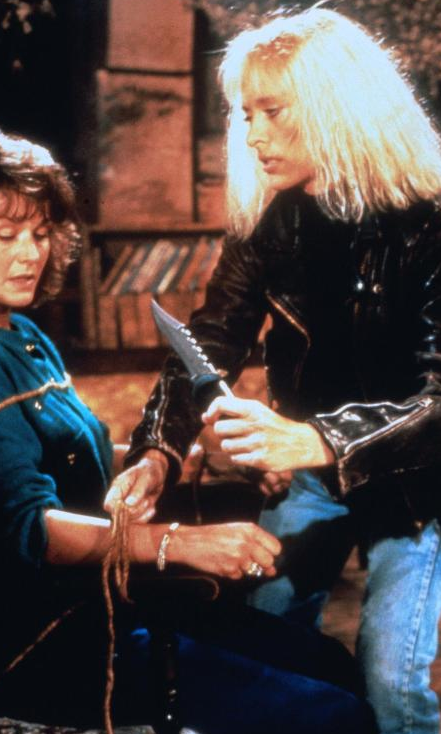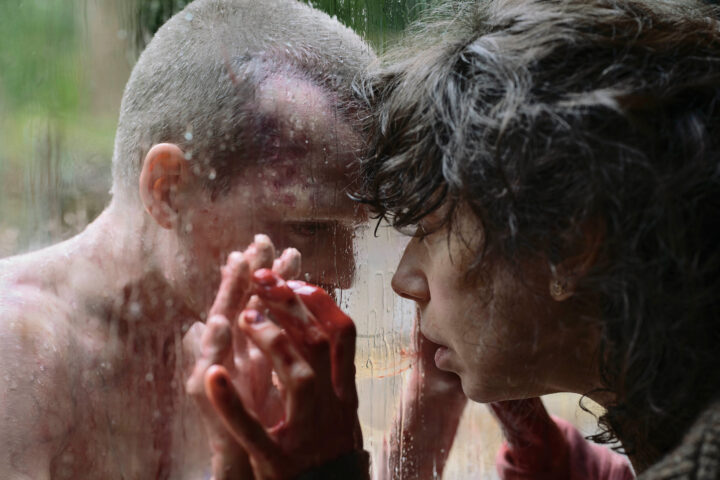Three decades ago I spent many a late evening with Sybil Danning—the arresting Austrian model turned American movie star, she of the hourglass physique, disarming screen presence and tongue-meet-cheek relationship with her often outrageously entertaining movies—at the small-town Michigan drive-in where I was schooled in the pitfalls of women in prison, women on-the-run in South American jungles and of course, women (Amazons, no less) on the moon.
If this was my education in genre pictures, Danning gave me a master class as a tough prison warden, drug dealer’s moll, knife-wielding inmate, intergalactic freedom fighter, professor turned seductress and lunar queen supreme. In many a picture, the star made signature entrances in extravagantly elaborate get-ups mandating that her generous proportions precede her, blatantly engineered acts of icon building (they worked).
Danning was recently in Chicago for a two-picture retrospective at Chicago’s famed Music Box movie palace, the historic enclave nestled the city’s Wrigleyville neighborhood. On the bill were the seminal Chained Heat, widely regarded as the apex of women behind bars exploitation, and the high-camp The Howling II: Your Sister is a Werewolf, featuring Danning as a hirsute, centuries old Lycan queen paired with frequent co-star Christopher Lee.
In person, Danning looks every bit the stylish and buxom star she did yesterday as the woman who began her career posing for pictures (and later did again in Playboy) before starring in them, notably as an Entebbe terrorist opposite Klaus Kinski in the 1977 Oscar-nominated Operation Thunderbolt. That she settled into a Hollywood career capitalizing on her near-ethereal beauty was no surprise. She knew it, and had a fun ride. So did those of us reared on Reform School Girls, Jungle Warriors, They’re Playing with Fire, Hercules and the rest. What a time.
Truth be told, it’s those entertaining 80s genre movies that provide the requisite escape today when the mortgage is due, the job is stressful and the inevitabilities of adult life intervene. I may wear a suit to the office, but my thoughts frequently drift to scenes like Chained Heat’s famed womano-a-woman between Danning and Cleopatra Jones herself, the late Tamara Dobson.
Meeting Danning took me straightaway back to that dusty drive-in with the star I so revered—strong, smart, funny and mostly just a damned good actress having fun with, but never making fun of, her many exotic movie personas.
Let’s start when you were a very young girl in Austria. You traveled around quite a bit, living on a variety of military bases. What are your thoughts on that period?
When I was very young I enjoyed it, because as a child you love traveling around. I remember sitting in the backseat with my cat and seeing a lot of this country, because I lived here for five years. As I was older, it became more difficult. When you are older you create relationships that are more meaningful, so it was more difficult to keep moving.
A significant part of your legacy is your trademark onscreen strength. Can you trace this confidence back to your childhood?
Yes, I think so. I remember when I was not more than 6 or 7 years old and I loved to play in this junkyard where they had old, broken down cars. I would go there with my boyfriend and I was always the driver while he was the guy sitting next to me! My mother would go out looking for me at lunch time, calling my name, and I was up in the trees climbing with the boys. I never had dolls. I had clowns. I don’t know why I had clowns. But I was always playing with boys, so I was very much a tomboy. So I think that comes from when I was very young.
Later, I got to know Clint Eastwood, who is a very nice man. When I went to his office for a meeting on the Warner Bros. lot, I came in and said, ‘Oh, by the way, I parked where it says Clint Eastwood outside. Is that okay?’ And they said, ‘No, definitely not. Mr. Eastwood took a baseball bat to the car of last person who parked there.’ So I was out there really fast! When he was the mayor of Carmel I was on his roast, and I got to know him as a wonderful person. But he has as dark edge to him, so maybe that comes somewhere from his childhood too. They always say that there is something in a character that you play, otherwise you would not be able to pull it out. I guess there is always a little something in everyone.
You started working very young as well. You emancipated yourself as a teen and had jobs out in the world, wanting to be a cosmetologist. You also found work in a dental supply company.
I worked very young, yes. I was independent very young. So I was always taking care of my younger brother and sister. I was old at a very young age. So now, in my older years I am having fun! I am living my youth in my old age!
Your film career began in 1968 with Lorelei and the release of your first movie, “Come Now, My Dear Little Bird.” After that experience, did you know that you’d make a career in movies?
No, not at all. It was absolutely not planned. I was living in Salzburg and had already gone into doing cosmetology. It was also a modeling agency and I ‘hired myself’ for jobs. I answered the phones and would say, ‘Yes, we have Sybille Danniger for Saturday night for this fashion show.’ So I was basically booking myself.
One day a photographer called and said, ‘Sybille, there is a director here who saw your pictures and would very much like to have you in his movie.’ His name was Rolf Thiele and he was from the Czech Republic, Czechoslovakia at that time, and I went there and did it. In freezing cold November, we shot on this cliff overlooking the Rhine River. Laying on a train on the way back home—there was no flight—dead sick, with a high fever and because I got paid so little, I said, ‘If this is movie-making, it is not for me.’ So that was Lorelei. I went back to modeling in Austria and said, ‘This is easier. I like this. It’s a nice job. I don’t have to freeze on some cliff and I’m making more money too.’
But then not long after, there I was sitting on the Rhine River across two pages in Germany’s Stern magazine, which created a lot of PR. And that caused the next role to come and then the next role. I got an agent and that was where it started. But it was never planned. I didn’t want to do it. I had that experience and said, ‘This is not for me.’
And then you made a series of movies in Europe before you considered Hollywood, including a very good one in 1977 directed by Menahem Golan, Operation Thunderbolt, which was about Entebbe and received an Oscar nomination for Best Foreign Language Film. You were paired with Klaus Kinski as the terrorists, and you wore sunglasses throughout the film except for two key moments, including a memorable scene where you discover that one of the hostages may have stolen a knife.
Yes. I was modeling in Milan and Menahem Golan called me and said, ‘Come, we’re going to do Entebbe.’ And I said, ‘You and ten others.’ Marvin Chomsky had already started his (Victory at Entebbe) with Elizabeth Taylor, which was terrible. They shot it in one week to get it out fast. Irvin Kershner was already in production on his big action movie (Raid on Entebbe). I said to Menahem, ‘There are so many.’ He said, ‘It doesn’t matter. I have all of the real details. I interviewed some of the hostages and by the way, you have to wear dark glasses, because they told me that she wore dark glasses all the time.’ She was a very sadistic woman. And they felt that this happens a lot of times psychologically when people have something to hide. I said to him, ‘That’s okay, I’ll do it.’
But as an actor, it is all in the eyes—when you think, when you don’t speak and when you listen. So I said, ‘Fine, I’ll do it. But you have to let me have at least one scene where I take my glasses off.’ So the scene that you mention, where I say, ‘Wilfried! The knife!’ That is where her fanaticism came through, and it was my idea to show that.
But going back to the beginning, Menahem says, ‘Come to Munich.’ So I went to Munich and he said, ‘ You’re going to play her with the glasses. She isn’t sexy, so you have to do something with yourself.’ I said, ‘Don’t worry!’ I wore a wig and no make-up.
And loose fitting clothing.
Yes, loose fitting clothing. So then Menahem said, ‘We also need the money.’ I said, ‘Well, is there anything else you need?’ He said, ‘Yes, we need someone to play Wilfried.’ I said, ‘Well, there is only one guy—and it’s Kinski.’ And Kinski didn’t know anything about Entebbe. I called him up in Paris and he didn’t even know this Israeli director (Golan). He said, ‘I don’t want to read the script. Just give me (this enormous amount of money).’ And I’m standing there repeating this and Menahem goes crazy!
Well Menahem Golan and Yoram Globus were the kings of doing shrewd, low-budget movies that were incredibly profitable.
Oh yes. They are doing a documentary on Cannon Films and I am going to be in it. So I basically said to him, ‘Look, Klaus. Talk to your agent. Call me back tomorrow. You are going to literally go down in history if you play this role. But I need to know tomorrow.’
He called me the next day and his attitude had totally changed to ‘Yes, I am going to do it.’ We got all of the money to do it from the distributor, but they did not want Klaus because he was an enfant terrible at that time, going around Germany with a play and known to spit at the audience when someone would make a remark. That’s how crazy he was! So he was known to be unprofessional. The Germans said, ‘No, not him.’ I said, ‘Look, I will put my hand in the fire for him. Everything is going to be fine. I will tell him that he is not going to get paid until the movie is over and if he makes any trouble, he won’t get paid.’ So I said to him, ‘You want the role, you got it. But they are not going to pay you one penny until the movie is over. If you make any trouble at all, they are going to sue your ass off.’
He was so wonderful and professional. The movie showed this and you are right, we were nominated for Best Foreign Language Film. The Los Angeles Times gave Klaus and I a wonderful review and said we were very good in the roles. Overplaying that characters could have become a caricature and underplaying would have been boring. It wasn’t easy to find the right level, and we did.
Speaking of caricature, you have a larger-than-life quality that could have easily veered in that direction, yet didn’t. I get the sense that you had a tongue-in-cheek sensibility, perhaps even when others did not. For example, the ménage scene in The Howling II where you literally grow all of this hair. It’s a stitch.
Well let’s put it this way. I take every role that I do seriously and I leaned that from Christopher Lee. I’ve done five movies with him, and he told me, ‘Sybil, you are standing there with hair all over your body and it’s actually ridiculous. But you have to take it seriously and be serious about it.’ I have always done that with every role. I have fun with my roles and think that is why they come across as good or having fun watching them. But you will never get the feeling that I am making fun of something I am doing or someone I am playing with. But I am having fun with it.
And of course you were frequently called upon to deliver outrageous dialogue.
Men are useless!
Amazon Women on the Moon…
Oh boy, you are good.
In many of your films, you also patented what might be called a signature entrance.
I’ve always believed introducing a character was very important, and not all of mine were well-introduced. So I would give an example of how I would want to introduce it. Right now, I have a women-in-prison movie (in development), and I will be playing the warden in that. And I didn’t like that she was just there. So I am going to do a rewrite on that in the screenplay. In the movies, I think the way you introduce both heroes and bad guys is very important. And great directors and movies do that. In connection with my costumes, of course, all of that makes an impression. That is what movies are about—you have to make an impression.
Quite an impression in the opening scene of They’re Playing with Fire, where you are sunbathing on a yacht to this great 80s song—the kind of original song they wrote for movies at that time—and then you go from a swimsuit to a business suit. But you’ve always been very comfortable with showing your body onscreen.
Yeah. And I think that is probably because I started my career in Europe, and in Europe doing scenes with less or no clothing, or just being topless, is a natural thing. You can go to every swimming pool in a normal city and women will be sunbathing topless. And no one thinks anything of a woman with beautiful breasts bared, sunbathing. So you are raised with a different way of looking at your body, or the human body. And the nudity of the body is nothing. I did nude scenes in movies in Europe. So if you can feel comfortable without clothing then in front of the camera it is not so difficult.
I can’t think of another actress since who seems as confident in her physique and particularly in action movies—tough yet very feminine. Can you?
That’s a very good question. I love Angelina Jolie. I think she is wonderful. I just think she is incredible, especially in the action scenes. But then she doesn’t really take her clothes off, does she?
Well, earlier in her career she was more free about that. For example, when she played the tragic model Gia Carangi. Back then she was a bit less guarded in that respect. However, she certainly ‘stalks’ through her movies like you did—especially in Wanted—so that could be the closest one.
I didn’t see Gia, but I know that is really what made her.
One of my favorite movies you appeared in was Jungle Warriors, about a crew of ‘models’ who get stranded in the South American rainforest at the mercy of drug dealers. You were the kingpin’s right hand woman.
I enjoyed Jungle Warriors very much. We shot that in Mexico, not far from Mexico City, in a little hacienda called Tequesquitengo. Paul Smith and I were in another movie together called The Salamander with Franco Nero, where we played brother and sister.
He’s terrific in this movie, the way he keeps sniffing the rose.
Paul is great. I enjoyed the role in Jungle Warriors. I had beautiful costumes and dresses. It wasn’t a very large role but I enjoyed playing it. I had a lot of fun.
It was a lot of fun to watch when you had the models tied up, toying with them.
Oh yes. Torturing the girls. That was also quite a successful scene for Ava Cadell. She actually came to me at lunchtime and said, ‘Sybil, you can do anything you want to do. You won’t hurt me. Anything you want to do is okay.’ She was very sweet.
And of course we had John Vernon.
Oh, yes, John was in Chained Heat also. What a great actor. I think I was the only one that didn’t get sick on that movie because everyone got very, very ill. Montezuma’s revenge! Only myself and the director, Ernst von Theumer—he was also Austrian—did not, and I guess it was something about our stomachs that we were used to the food! I ate everything, but I also had tequila, so it probably killed all of the germs!
I don’t know if you knew this, but we were supposed to have Dennis Hopper in that movie. He came down (to Mexico) and we sat together the night before he was to shoot. I wasn’t shooting the next day, and we sat up drinking beer and tequila. At three in the morning I said, ‘I am going to bed.’ And I left him. He was still up. And the next morning, everyone was in an uproar—especially the director—because (Dennis) continued to drink and got so drunk. He took his clothes off and walked outside of the hacienda onto this normal, Mexican street, which was just a dirt road! Evidently the police found him in a ditch, naked, and took him to jail. It took a day to get him out so that entire day was shot. They sent him back to Los Angeles. He lost that role.
But on a good note, that helped him sober up. I think he was sued also because of the outfall of his role; they had to get someone else. And after that, he cleaned up his act. God bless his soul because I really loved Dennis and he is no longer with us.
And of course he later played that alcoholic role in Hoosiers so beautifully.
Oh, I loved him in Hoosiers. He was a wonderful actor and a great human being. The last time I saw him was at a gallery. He is a wonderful photographer too, and he had an exhibition in Los Angeles. So he was doing a lot of great stuff. It’s too bad.
You mentioned Chained Heat, the pinnacle of women-in-prison movies and one of your most memorable performances, squaring off against Tamara Dobson with a switchblade. Could you really handle a switchblade?
Oh yes! It was fun. Great characters and great story.
You also played a tough warden in Reform School Girls with Wendy O. Williams. What are your thoughts on the genre?
Well, I have male and female fans, and women-in-prison movies appeal to men and women, which makes them successful. When a genre is successful, why not do it? It’s fun to do. After Chained Heat and Reform School Girls I turned down so many rip-offs. Chained Heat is considered the best one ever. I have a screenplay right now that is a women-in-prison movie. I sent it to Tom DeSimone, the director of Reform School Girls, and told him I’d like him to direct. And he thought it was a good script, but said ‘Sybil, I’ve been there and done that.’ Tom said, ‘Sybil, why don’t you direct it? You know the genre better than anyone else.’ So I am going to direct it.
I’ve brought it to the studios and have been told ‘It’s not for us.’ Because everyone is doing horror and thrillers now. So I’m raising the money privately. If it’s not a good project, I don’t want to do it. And I have that now in this new script.
You also worked twice with Lou Ferrigno. In Luigi Cozzi’s Hercules, you gave us the goddess Ariadne in a classical performance could have easily passed muster in a more serious movie about ancient Greece.
We had a lot of fun. It was fun taking Hercules prisoner. I guess I was playing the evil queen.
And you had a great death scene in that one.
Oh, yes. And then Lou and I went on to do The Seven Gladiators together. We shot both films in Rome, and shooting a period piece like that is always fun when you are on location, because it puts you into the scene, century and time period. So we loved it. I remember that Lou and I were at Cannes doing publicity and he was so bulked up because ever since he was a little boy his dream had been to play Hercules, and this was his dream come true. When we would go to lunch he would order a huge bowl of pasta, like for four people. I would have a half chicken and he would eat two chickens. He would have a whole bowl of egg salad. He was working out like crazy and bulking up. I just saw him recently and he looks very different; not so bulked up. He is a now reserve policeman with the LAPD. We had a great time.
Being pulled over by Lou Ferrigno would be surreal. Now let’s talk about The Howling II: Your Sister is a Werewolf, one of the great cult movies, in which you play the werewolf queen, Stirba. There is a strong sense of camp running through that movie.
I think it’s that thing, again, where I don’t think it’s funny, although there are a few funny moments in there. For some reason it is very entertaining.
Yes it is a lot of fun to watch. Your director, Philippe Mora, made good use of the locations. I’ve always wondered what you were thinking in that scene where you are presiding over an orgy at your feet. You have this very sly, wry expression.
On my throne! Yes, it was my kind of party. It’s animalistic. It was all fun. We shot it in the Czech Republic in a castle, and Philippe Mora really knows how to create atmosphere. He made that castle look so beautiful with the candles. You just got into it. You were sitting in an actual castle!
But you must have found it funny when Reb Brown and Annie McEnroe are supposed to be having sex—against a wall—and he doesn’t remove his jeans.
Because the movie was not really about sex, I think perhaps Philippe thought he could pass that off for the broader audience. But Reb Brown and Annie McEnroe were very conservative people, if you can imagine that scene! Even our scene was kind of racy.
At what point did you realize that you were regarded as one of the world’s sexiest women? Was it when you did Playboy? Was it Hollywood’s response to you?
You know, I never thought of myself as being that sexy. I see so many beautiful women, so I didn’t think there was anything that special about me. I never thought that. What I think my manager at time said was, ‘You have done sexy movies in Europe and you have a very strong mind; you are a very strong woman. If you could stay in the forefront and play a man’s role but be a woman doing it, it will be very sexy.’ So my fans even thought I was sexy in L.A. Bounty, where I wear a turtleneck, jeans, boots and a leather jacket. So it’s not about the cleavage or taking clothes off. I think it’s probably an attitude of inner strength along with the role, because I am a woman doing it. I don’t find myself that sexy.
Come to think of it, I don’t think I’ve ever seen you in a fragile role, like the hero’s sidekick, wife or girlfriend. In all of your work you deliver a certain edge.
I tend to like to look for those roles. I have turned down many movies because believe it or not, the director would come to me and say, ‘You are this guy’s wife and then you break down and you are a wonderful person, but too weak to deal with this or that.’ And then I say, ‘Why would I want to play that?’ I like playing strong women’s characters because I like being a role model for women and helping them.
After Chained Heat, a girl in a restaurant approached me and said she was on the verge of losing her job. She had seen the movie five times. She said, ‘You gave me so much strength to fight.’ So when I hear things like that, I feel there are a lot of women who are better at playing those other roles than I am, because I don’t feel it inside. Yes, an actor should play all kinds of roles. But I see myself as an actor playing the kinds I want to play. Like horror movies, for example. I am not in them even though they are very popular. With The Howling II, I got to play the queen, so the villain is okay too. It’s much more interesting to play a villain than someone who is weak. The horror films I get offered are where I get chased down, caught, chopped up—why would I want to do that? On the contrary though, if I would be the killer I wouldn’t mind, because villains have always been the most interesting characters.
Switching gears, I’m wondering if you’ve seen a movie recently, or even in the past, where you said, ‘I’d love to have done that one.’
Good question. I really loved Mr. and Mrs. Smith. Wow. I would have loved to have played that role. I really enjoyed that.
And what is going on right now? What’s on the horizon?
What isn’t going on? There is so much. Mark Zicree, a writer from Star Trek, is putting together a project called Space Command, and they have asked me to come aboard. I don’t yet know what role I’ll be playing, but there are either going to be four features or eight television episodes. The person who brought me to that project was Neil Johnson, the writer-director-producer of Humanity’s End and also Alien Armageddon. He is also doing another project named Starship, and would love for me to be a part of both Starship and Space Command. So those are in the planning and I am very excited!
I haven’t done that much sci-fi but what I have done has been successful, and this will be my return to sci-fi. I am very happy about that because I love it. As you can see, Battle Beyond the Stars just came out on Blu-ray. It’s a wonderful classic that keeps having another life.
What I am doing on my own is from a movie you might have seen named L.A. Bounty. The story was mine, and I worked with Michael Leighton who wrote the screenplay; we produced it together. I played an LAPD officer turned bounty hunter with Wings Hauser, who is wonderful in the movie.
Of course. I always think of him in Vice Squad terms, which was his iconic performance.
Yes! As a matter of fact, some of my girlfriends were so crazy about him but at the same time so scared of him. Because what did he do? He beat a woman with a clothes hanger?
Yes, Nina Blackwood, who later became an MTV VJ.
Yes. So on the one hand they were very scared of him, but on the other they were fascinated by him.
Yes he has that quality. So does Michael Ironside.
I love Ironside. He is great. So Wings was wonderful. And they said to me, ‘Wow, how can you work with him? He is so scary.’ I said, ‘He’s a wonderful actor and person.’ He is a great actor.
So my character in L.A. Bounty is called Ruger, and I own that character. So around that character I have created a feature film screenplay, and based on that I also have a video game in development. My dear friend and partner in Las Vegas is Les Thomas, a wonderful gay man—and I have a lot of fans in the gay community so I am very proud to mention that—an absolute professional in the gaming industry and very knowledgeable. As my executive producer, he is launching a Kickstarter crowd-funding initiative for Ruger, which is going to be a first-person shooter game. We are working with an artist right now who specializes in 3D, but he is doing 2D as well. And simultaneously, we are in development on a graphic novel. I am very excited.
So you are very busy with this character. Like many of your onscreen personas, she has really lasted, given that the film was released in 1989.
Well the movie was so successful. It sold everywhere—even to Russia. At that time, I very proud to be among a five-movie package sold to Russia which also included Rambo and Commando. So it was Schwarzenegger, Stallone and me! It was successful worldwide and played everywhere on television, so it was just a matter of taking advantage of that. I wanted to make a franchise out of it.
What is the best part about your job?
It’s really the satisfaction that I get from my fans. As you know, I was away from the business for fourteen years. I didn’t do anything. The reason I came back is because I did the Chiller convention, and the manager was a friend of mine who said, ‘Sybil, for years your manager wouldn’t let you do this. Would you?’ And I said, ‘I will.’ I wanted to go back into the business and I thought the best way would be to find out from my fans. Because if they had said, ‘Great seeing you, here sign this,’ then… But then I saw my fans coming with suitcases of posters and pictures and magazines, with their arms and bags filled with things they had collected throughout the years for me to sign, and they didn’t just say, ‘Oh, great, thank you.’ They said ‘When are you going to do another women-in-prison movie? Another Howling?’ Even They’re Playing with Fire. I have a few that always come up again and again. And I said, ‘Maybe I will.’
Special thanks to Sybil Danning for this interview
